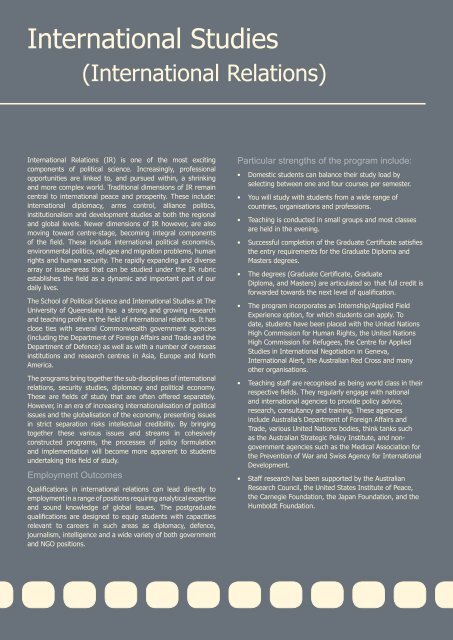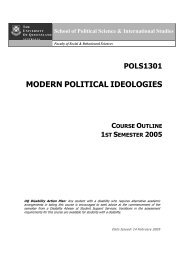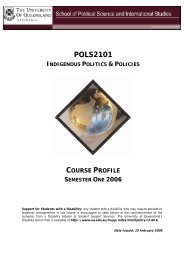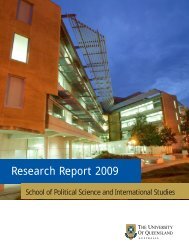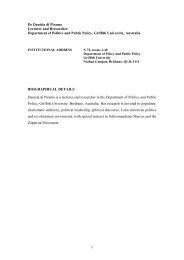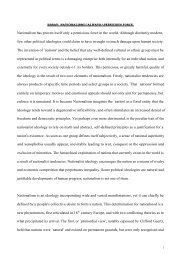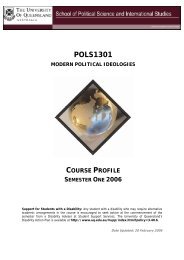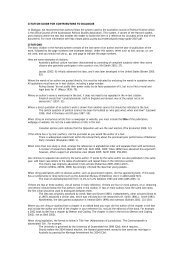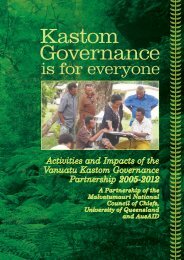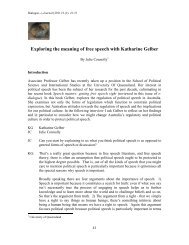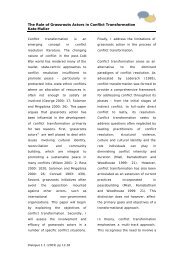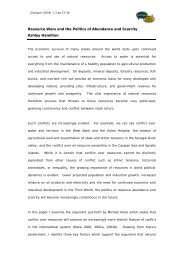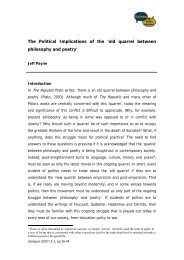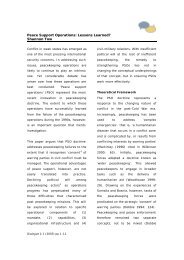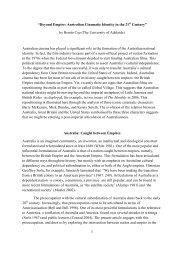International Relations - School of Political Science and ...
International Relations - School of Political Science and ...
International Relations - School of Political Science and ...
Create successful ePaper yourself
Turn your PDF publications into a flip-book with our unique Google optimized e-Paper software.
<strong>International</strong> Studies<br />
(<strong>International</strong> <strong>Relations</strong>)<br />
<strong>International</strong> <strong>Relations</strong> (IR) is one <strong>of</strong> the most exciting<br />
components <strong>of</strong> political science. Increasingly, pr<strong>of</strong>essional<br />
opportunities are linked to, <strong>and</strong> pursued within, a shrinking<br />
<strong>and</strong> more complex world. Traditional dimensions <strong>of</strong> IR remain<br />
central to international peace <strong>and</strong> prosperity. These include:<br />
international diplomacy, arms control, alliance politics,<br />
institutionalism <strong>and</strong> development studies at both the regional<br />
<strong>and</strong> global levels. Newer dimensions <strong>of</strong> IR however, are also<br />
moving toward centre-stage, becoming integral components<br />
<strong>of</strong> the field. These include international political economics,<br />
environmental politics, refugee <strong>and</strong> migration problems, human<br />
rights <strong>and</strong> human security. The rapidly exp<strong>and</strong>ing <strong>and</strong> diverse<br />
array or issue-areas that can be studied under the IR rubric<br />
establishes the field as a dynamic <strong>and</strong> important part <strong>of</strong> our<br />
daily lives.<br />
The <strong>School</strong> <strong>of</strong> <strong>Political</strong> <strong>Science</strong> <strong>and</strong> <strong>International</strong> Studies at The<br />
University <strong>of</strong> Queensl<strong>and</strong> has a strong <strong>and</strong> growing research<br />
<strong>and</strong> teaching pr<strong>of</strong>ile in the field <strong>of</strong> international relations. It has<br />
close ties with several Commonwealth government agencies<br />
(including the Department <strong>of</strong> Foreign Affairs <strong>and</strong> Trade <strong>and</strong> the<br />
Department <strong>of</strong> Defence) as well as with a number <strong>of</strong> overseas<br />
institutions <strong>and</strong> research centres in Asia, Europe <strong>and</strong> North<br />
America.<br />
The programs bring together the sub-disciplines <strong>of</strong> international<br />
relations, security studies, diplomacy <strong>and</strong> political economy.<br />
These are fields <strong>of</strong> study that are <strong>of</strong>ten <strong>of</strong>fered separately.<br />
However, in an era <strong>of</strong> increasing internationalisation <strong>of</strong> political<br />
issues <strong>and</strong> the globalisation <strong>of</strong> the economy, presenting issues<br />
in strict separation risks intellectual credibility. By bringing<br />
together these various issues <strong>and</strong> streams in cohesively<br />
constructed programs, the processes <strong>of</strong> policy formulation<br />
<strong>and</strong> implementation will become more apparent to students<br />
undertaking this field <strong>of</strong> study.<br />
Employment Outcomes<br />
Qualifications in international relations can lead directly to<br />
employment in a range <strong>of</strong> positions requiring analytical expertise<br />
<strong>and</strong> sound knowledge <strong>of</strong> global issues. The postgraduate<br />
qualifications are designed to equip students with capacities<br />
relevant to careers in such areas as diplomacy, defence,<br />
journalism, intelligence <strong>and</strong> a wide variety <strong>of</strong> both government<br />
<strong>and</strong> NGO positions.<br />
Particular strengths <strong>of</strong> the program include:<br />
• Domestic students can balance their study load by<br />
selecting between one <strong>and</strong> four courses per semester.<br />
• You will study with students from a wide range <strong>of</strong><br />
countries, organisations <strong>and</strong> pr<strong>of</strong>essions.<br />
• Teaching is conducted in small groups <strong>and</strong> most classes<br />
are held in the evening.<br />
• Successful completion <strong>of</strong> the Graduate Certificate satisfies<br />
the entry requirements for the Graduate Diploma <strong>and</strong><br />
Masters degrees.<br />
• The degrees (Graduate Certificate, Graduate<br />
Diploma, <strong>and</strong> Masters) are articulated so that full credit is<br />
forwarded towards the next level <strong>of</strong> qualification.<br />
• The program incorporates an Internship/Applied Field<br />
Experience option, for which students can apply. To<br />
date, students have been placed with the United Nations<br />
High Commission for Human Rights, the United Nations<br />
High Commission for Refugees, the Centre for Applied<br />
Studies in <strong>International</strong> Negotiation in Geneva,<br />
<strong>International</strong> Alert, the Australian Red Cross <strong>and</strong> many<br />
other organisations.<br />
• Teaching staff are recognised as being world class in their<br />
respective fields. They regularly engage with national<br />
<strong>and</strong> international agencies to provide policy advice,<br />
research, consultancy <strong>and</strong> training. These agencies<br />
include Australia’s Department <strong>of</strong> Foreign Affairs <strong>and</strong><br />
Trade, various United Nations bodies, think tanks such<br />
as the Australian Strategic Policy Institute, <strong>and</strong> nongovernment<br />
agencies such as the Medical Association for<br />
the Prevention <strong>of</strong> War <strong>and</strong> Swiss Agency for <strong>International</strong><br />
Development.<br />
• Staff research has been supported by the Australian<br />
Research Council, the United States Institute <strong>of</strong> Peace,<br />
the Carnegie Foundation, the Japan Foundation, <strong>and</strong> the<br />
Humboldt Foundation.


